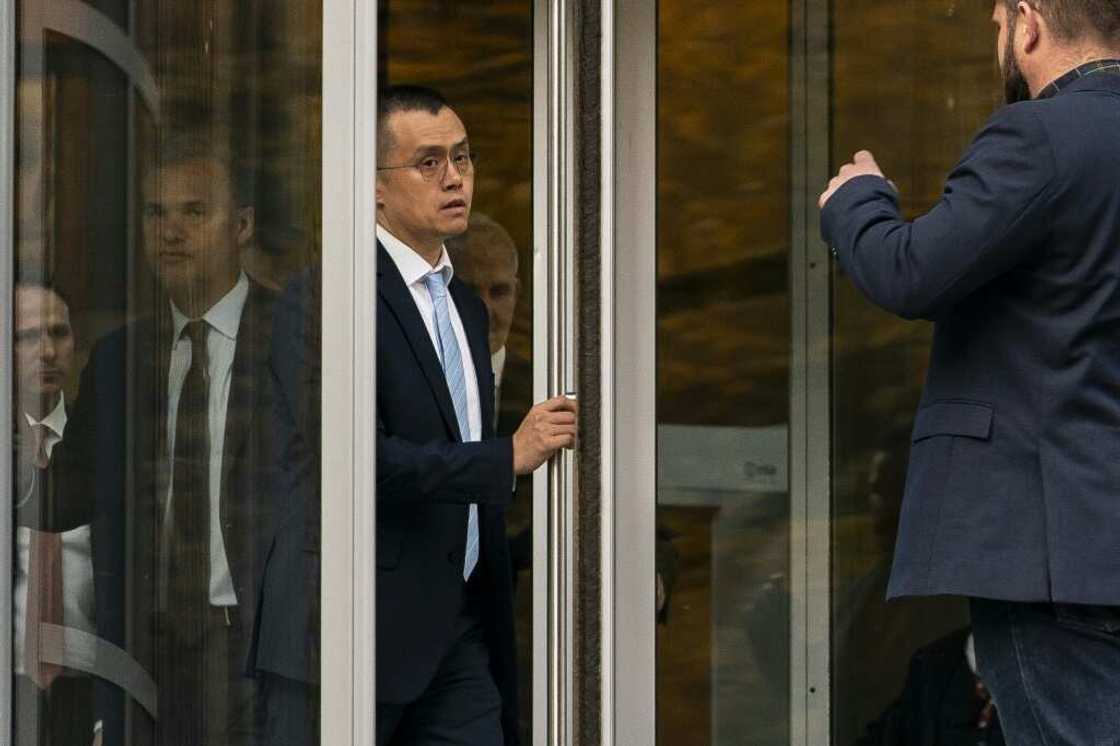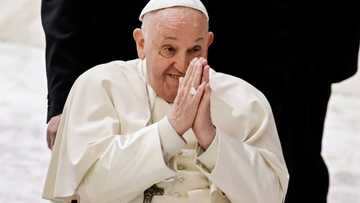Changpeng Zhao, the 'normal guy' who conquered crypto

Source: AFP
During his time at the helm of the world's biggest cryptocurrency firm, former Binance boss Changpeng Zhao, who will be sentenced in the United States later Tuesday for money laundering, perfected the humble executive look.
At parties, on stages and in meetings, he was rarely seen without his black polo shirt, emblazoned with the insignia of his firm -- complemented by the corporate logo tattooed on his arm.
It was vital to cement the myth of a boy who came from hardship in China and once flipped burgers for a living in Canada -- before making a fortune still estimated in the tens of billions.
"I'm a small entrepreneur," and a "normal guy", the man known in crypto circles as "CZ" told AFP in 2022 when comparing himself to Elon Musk, whose buyout of Twitter (now X) Zhao later backed with $500 million.
Yet there was little normal about Zhao's leadership of Binance, a company that largely cornered the crypto-trading market before careening into a slew of charges including sanctions busting and illegal trading.
Zhao, who founded Binance in Shanghai in 2017, emerged as the most visible figure in crypto after his great rival Sam Bankman-Fried was arrested in 2022 for masterminding a giant Ponzi scheme.
PAY ATTENTION: Share your outstanding story with our editors! Please reach us through info@corp.legit.ng!
During his rival's downfall, Zhao was there to twist the knife, first suggesting he might buy FTX before very publicly withdrawing.
A year later, it was Zhao's turn for contrition.
He pleaded guilty to violating US anti-money laundering laws and agreed to step down as Binance CEO, the authorities announcing later that the firm would pay a $4.3 billion settlement.
True grit?
The legal cases painted a picture of Zhao as a ruthless operator pursuing growth at all costs.
It was a far cry from the folksy legend he had fostered, which had become almost mythical in crypto circles.
Zhao's early life in China was scarred by hardship when his parents were sent to the countryside for a dose of peasant reality -- a common punishment for those suspected of having capitalist sympathies during the Cultural Revolution of the 1960s and 1970s.
They emigrated to Canada in the late 1980s, where young Zhao worked at a McDonald's and a petrol station to help the family survive, according to his own account of his life and a blog from 2020 on the Binance website.
This instilled "drive, grit, and initiative" into the young man and helped to create a "crypto leader", the Binance blog said.
Zhao's nomadic childhood informed his adult life, which has seen him crop up everywhere from New York to Tokyo.
The official legend has it that he caught the bitcoin bug during a conversation around a poker table in Shanghai in 2013, starting Binance in the Chinese city a few years later.
Beijing's crackdown on crypto hastened his departure from China and he began his voyage through various jurisdictions, establishing a raft of complicated corporate structures on his way.
For years, he kept regulators at arm's length by refusing to commit to a single jurisdiction for Binance's headquarters, repeatedly saying it was a "complex issue".
The stance made him a popular figure among crypto purists who loathe any form of regulation.
'Good old times'
But the whiff of scandal finally got too strong for US market regulators, who labelled Binance's compliance regime a "sham" and accused Zhao of orchestrating a "secret plot" to help VIP customers evade the law.
Then the law enforcement authorities came knocking.
Among other complaints, they accused Binance of failing to stop payments to the Islamic State militant group and other banned organisations in Iran and North Korea.
Unlike Bankman-Fried, Zhao was quick to admit guilt and avoid a high-profile trial.
But prosecutors are asking the court in Seattle to dole out a three-year prison sentence to Zhao.
In response to his troubles, Zhao has fallen back on his everyman persona.
He launched a start-up in March called the Giggle Academy that he said would aim to bring free education to underprivileged children around the world.
"Start up mode all over again. Like good old times," he wrote on X in early April, just weeks before he was due to be sentenced.
Among the subjects he is aiming to teach? Blockchain, AI and finance.
PAY ATTENTION: Unlock the best of Legit.ng on Pinterest! Subscribe now and get your daily inspiration!
Source: AFP






